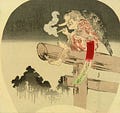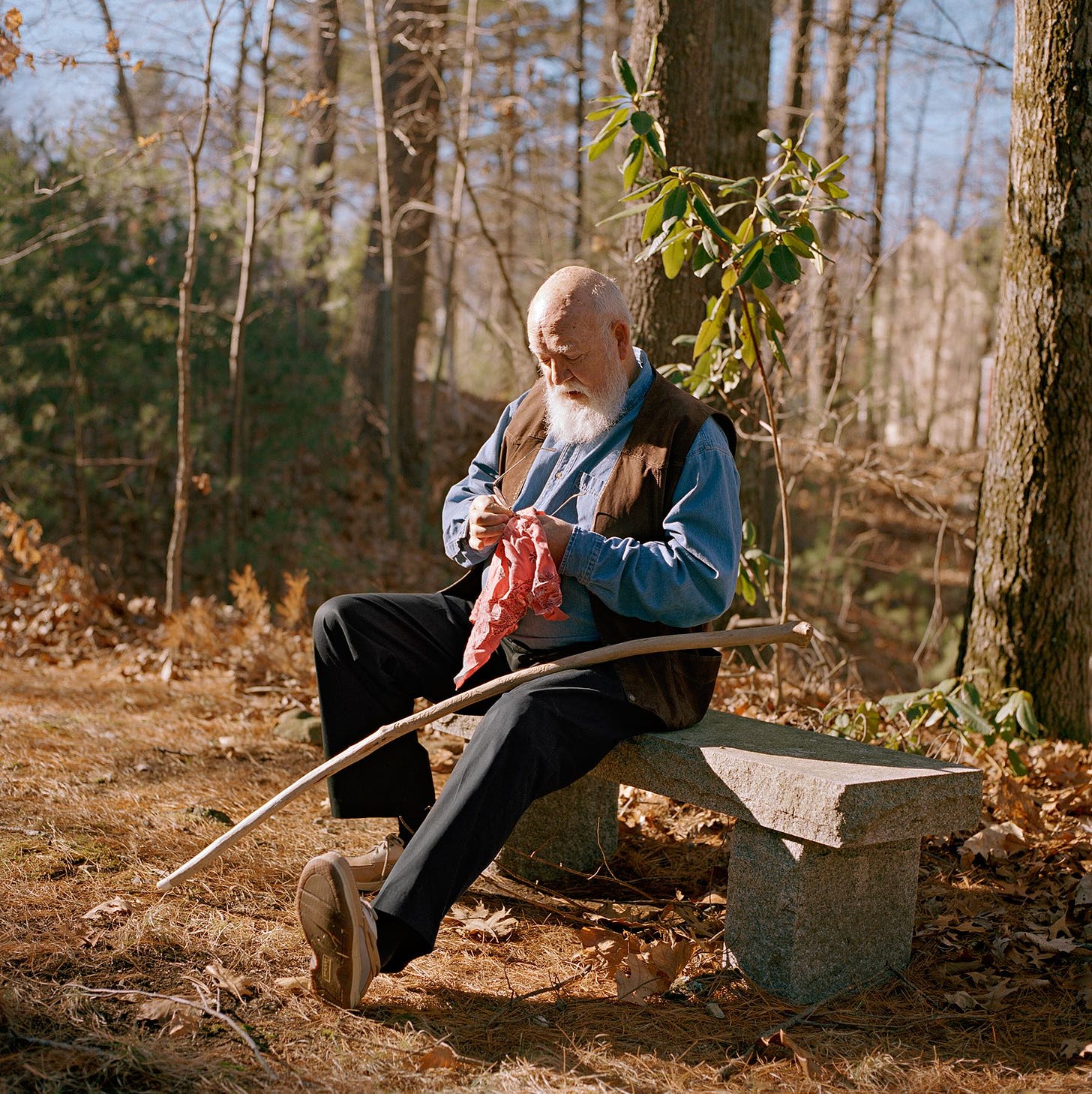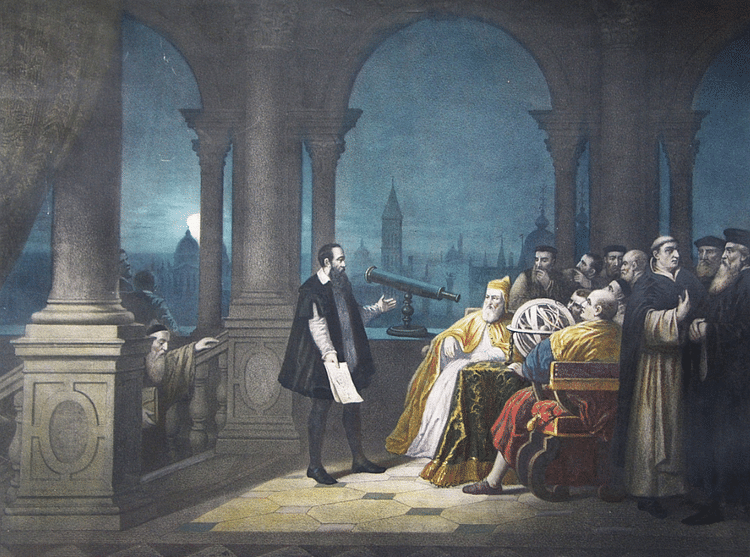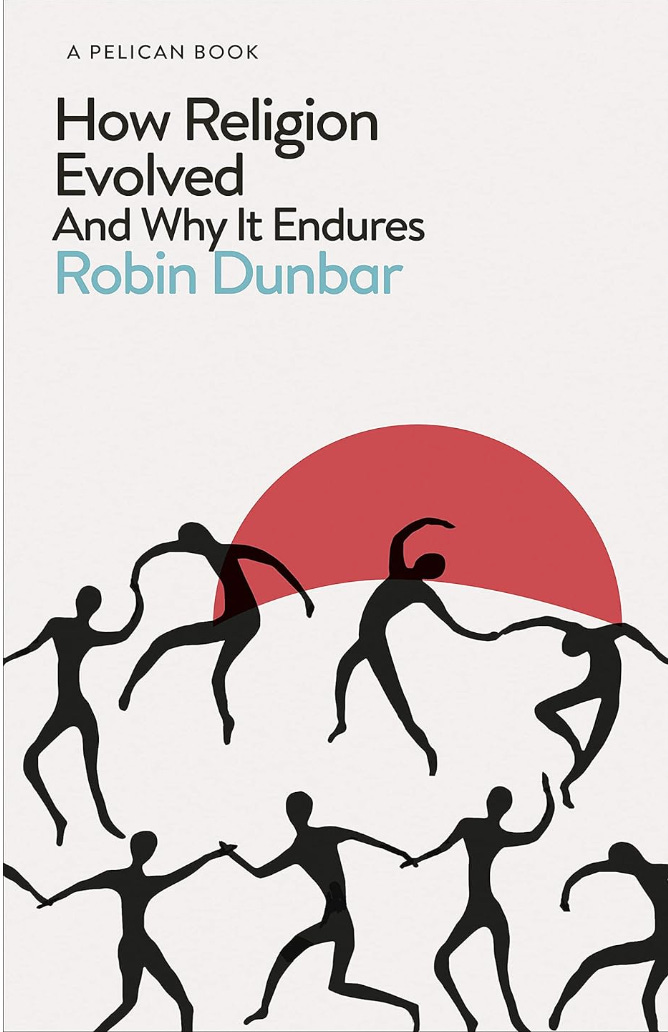One evening, a family were on their way home from working in the fields when they came across a woman crouching beside the river, smiling. The next day during the noon break, there she was again. On it went, day after day, until gradually the rumour spread that someone from the village was visiting this woman at night. At first, the visits only happened when her husband was away driving packhorses to the seaside. Later, they were made even when she was sleeping beside her husband.
Over time, it became clear that the visitor must be a kappa – a mischievous and deadly water spirit – and so the husband’s mother went and slept at the wife’s side, to protect her. But late at night, when she heard the wife laughing and knew that the visitor was here again, the old woman found it impossible to move her body. There was nothing anyone could do.
When kappa-children are born, they are hacked into pieces, put into small wine casks and buried in the ground. They are grotesque…
Stories like these, of sinister and predatory kappa, were amongst those collected from across rural Japan by the father of Japanese folklore, Yanagita Kunio. He told readers of books like The Legends of Tōno (1910) that he had written them down ‘just as I felt them’.
Here was a revealing turn of phrase, in an era when the natural sciences were credited with helping Japan to modernise and to vanquish Russia in the high-tech Russo-Japanese War (1904-5). Objectivity and practical utility were the very essence of modern science, as Japan’s leaders understood it. Feelings, by contrast, had their place: in the family, in the warm devotion that people owed the Emperor, in music and the arts. But they were not a means of gathering reliable information about the world. For Yanagita to record people’s testimony as he ‘felt’ it might be regarded as a form of scholarly malpractice.
A kappa, pictured in a nineteenth-century Japanese illustration
And yet this was precisely the point that Yanagita wanted to make. He was counselling his contemporaries not to limit their idea of ‘knowledge’ to that which the sciences and logic alone provide (writing in Japanese, he referred to logic as ‘rojikku’, the better to emphasise its dubious foreign origins).
What some dismissed as gumin or ‘stupid people’ - useful for tilling the soil and fighting wars, but incorrigibly superstitious - Yanagita regarded as possessing a precious connection to Japan’s natural landscape. To lose that connection, and to leave the business of investigating the world solely in the hands of university-educated professionals was to make do with a much-narrowed notion of reality, amounting to what Yanagita derided as gakusha kusai koto: ‘things that stink of the scholar’.
Kami, goblin-like tengu (‘heavenly dogs’), vengeful or kindly ‘mountain crones’, deer capable of travelling and mediating between worlds: who could say whether such things existed, or were perhaps intimations of unknown yet very real forces in the world? Yanagita wasn’t so much interested in persuading his readers one way or another as in preserving what he saw as a precious sensibility - kokoro no hataraki: ‘movements of the heart’ - to which these stories seemed to attest.
Difficult though it was to express in words, there seemed to be something about the world with which Yanagita’s fellow Japanese were in touch - and which they would lose their ability to see, hear or taste once this sensibility had been overwritten by modern life and education.
A tengu, enjoying a smoke atop a Shinto shrine.
In the first essay in this series, I looked at how historians try to explain the traction that certain stories manage to gain in particular times and places - how, for example, a ‘Japan in Danger’ story ended up being experienced as true by a great many Japanese of the late nineteenth century. I also explored the role played by evidence and perspective in defining a true story: what we do and don’t accept, for professional or personal reasons, as being valid evidence; the impossibility of thinking, speaking or writing about a set of events without first taking a perspective on them - choosing, or being drawn, to what seems significant and worth focusing on.
Yanagita Kunio’s surprising approach to Japanese folklore introduces us to a third theme in our pursuit of true stories: the question of how our ‘knowing’ works - and the possibility that despite our general faith in human knowledge improving over time, a society’s collective powers of knowing may sometimes atrophy.
Enter, at this point, New Atheism: a movement that was big in the 2000s and 2010s but which seems now to have run its course. To their critics, New Atheist scientists and writers like Richard Dawkins and Christopher Hitchens held such a low view of religion to start with - crazy beliefs, crazy behaviour - that they refused to study it with any degree of seriousness. The result was a noisy, shallow assessment - albeit an influential one, if sales of The God Delusion are anything to go by.
It was also the case, I think, that some of the major names in New Atheism were temperamentally unsuited to this kind of enquiry. I recently asked the atheist philosopher Daniel Dennett - one of the ‘four horsemen’ of the New Atheism - whether he thought there is such a thing as a feel for religion, as there is a feel for music (Dennett is a talented pianist and singer). He agreed that there probably is, but he seemed to regard such a feel more as a propensity for being deluded about the world than as a gift for knowing something real and valuable about it.
Daniel Dennett (photographed by Irina Rozovsky for The New Yorker)
Having failed to understand their enemy, the New Atheists failed to kill it off. Their influence lies, instead, in super-charging a process that was already underway in parts of the West, including the UK: narrowing - they might say ‘refining’ - our sense of what is true, and the faculties that we trust to help us get there.
For Richard Dawkins, religious language was either poetry or proto-science. The former is all very nice - and as a self-professed ‘cultural Anglican’, Dawkins holds Christian hymnody in high regard - but it renders religion basically interchangeable with literature (in which a ‘true story’ might be said to be one that reflects some aspect or other of the human condition).
The latter option, ‘proto-science’, suggests that religion is an attempt to describe some aspect or other of reality - in which case, for Dawkins and co., it is outdated to the point of being harmful: Christianity tells us no more about the actual nature of the cosmos, so the argument goes, than Zeus and his thunderbolts do about meteorology.
For philosophers like David Bentley-Hart, Philip Goff and Edward Feser, Dawkins’ and Dennett’s outlook has origins of a kind with Galileo Galilei (1564 - 1642). Natural philosophers of his generation sought to separate out aspects of the world that could be measured, and could thus form the basis for useful calculations, from those which could not be measured - even in principle, because a subjective, qualitative element was involved: things like colour, meaning, feeling, intention and a person’s sense of the divine.
Where Galileo did this for practical purposes, scientists in later centuries made a giant additional leap and questioned the reality of these things altogether. On what has now become a common reading, the emotions are reducible to goings-on in the material (measurable) world: biology and chemistry; evolution and the laws of physics. We still value the emotions, of course, but our perception of their value is likewise ultimately a matter of matter.
Galileo Galilei demonstrating his telescope (as imagined by the artist Henry-Julien Detouche in c. 1900)
It’s important not to lapse, at this point, into a simplistic critique of ‘scientism’: the claim that nasty old scientists want to reduce all of life to the language and concepts of the natural sciences, draining it of its magic and mystery in the process. Scientific materialism, or ‘Naturalism’, doesn’t necessarily mean that the cosmos is a barren, third-person affair, devoid of meaning, intentionality or personhood. Some would argue, for example. for ‘emergence’: the idea that complex physical forms yield brand-new, higher properties over time. In other words, if you believe that the cosmos doesn’t have God or Mind at its source, you might still argue that consciousness and all that comes with it emerges over vast spans of time.
I find all this fascinating, but as a humble historian let me stick to pressing the idea that dominant trends in thought can have the effect of narrowing our sense of possibility in the world. An example that might have shocked Galileo, devout Christian that he was, is the relatively recent discipline of the evolutionary psychology of religion, a major thread in which is the idea that even our most elevated religious intuitions arise from basic biological imperatives to survive and reproduce.
Some of these intuitions are ‘adaptive’ : morals, for example, are said to have their origins in the evolutionary advantages bestowed by co-operation and social cohesion. Others emerge as ‘spandrels’, or off-shoots: seeing or intuiting gods or other beings may be an off-shoot, it is thought, of a capacity that evolution has given us for being hyper-aware of potential threats in our surroundings. Better to have a false-positive sighting of a lion than a false-negative one - and get torn apart.
Robin Dunbar is an influential proponent of evolutionary theories of religion. How Religion Evolved was published in 2022.
Leaving aside the question of how robust these ideas are (Alvin Plantinga is a prominent and very readable critic), this way of looking at the world encourages us to treat our emotions, imaginations and intuitions as meaningful - in a limited, subjective sense - but liable to lead us astray when it comes to establishing reliable knowledge about the world around us.
This is quite a turnaround from long centuries of religious and philosophical traditions - not least in Asia - valuing and seeking to hone a range of human faculties, in confident expectation that they could put us in touch with truths about the world around us. Both ancient India and ancient Greece were home to philosophers who could be described as materialists or naturalists, understanding reality exclusively in terms of physical matter. But more common both in India and the West have been traditions that identify God, Mind or unfathomable oneness as more fundamental than the physical world.
In these traditions, faculties like emotion, imagination and intuition have been thought capable of supplying valid information about that reality - and perhaps helping a person to connect with it, or participate in it. Not to recognise this possibility was considered woeful, dangerous ignorance. In the words of the Katha Upanishad:
Abiding in the midst of ignorance, thinking themselves wise and learned, fools go aimlessly hither and thither, like blind led by the blind . . . “This is the only world,” they say – “there is no other”; and so they go from death to death.
In the western tradition, Ignatius of Loyola (1491 - 1556), co-founder of the Jesuits, developed ‘spiritual exercises’ that were geared towards using the emotions and the imagination to deepen a person’s relationship with the divine.
The New Atheism helped, I think, to downgrade our ambitions for what religious language, the emotions, imagination, intuition and silence might do for us - while at the same time giving an outsized role to a narrow notion of reason in settling big religious arguments. This was partly down to the temperament and rhetorical style of influential New Atheists like Richard Dawkins and Christopher Hitchens. But it was shaped, too, by the debate format that became characteristic of the New Atheism era. A premium was placed on snappy, gotcha-type arguments and factlets, and an atmosphere was created in which advocates for religion were painted as a bit shifty and liable to change the goal-posts in debate. That made it all the more difficult to appeal to subjective grounds for belief, since these would, by their very nature, be unavailable for scrutiny by one’s opponent.
For all the benefits of the mindfulness movement that came along towards the tail-end of the New Atheism era, in the mid-2010s, I see a certain pessimism in it that I think was connected to the New Atheist moment. Where New Atheism celebrated the liberating idea that there might be nothing out there - most famously in the 2009 bus campaign, featuring the slogan ‘There’s probably no God. Now stop worrying and enjoy your life’ - mindfulness was often taken up by people struggling to bear the burden of that same autonomy. Much was made, in mindfulness, of faculties like emotions and intuition, but predominantly (though not exclusively) their role in causing distress and in helping to alleviate it.
Hopeful advocates of meditation within Buddhist, Christian, and other traditions anticipated that people who started out practicing in order to shore up a lonely, physical self might at some point shift from coping to seeing. They might drop the sense of being the under-pressure author of their own story and find, instead, that they are a character in a much bigger story - divine, or at least somehow Mind-like, in which the fundamental interconnectedness of all things is an important part of the plot.
A gestalt switch of sorts was in the offing. ‘Life’ would appear less like their temporary possession and grave responsibility, for however many decades it might last, and more something that was on-going - always and everywhere - and in which they were participating.
Perhaps this is indeed how things played out for some, finding that faculties like their emotions and a capacity for deep silence really were capable of opening up the world in a brand-new way. No doubt Yanagita Kunio would have been proud of them, rolling back - as he might have seen it - centuries of modern conditioning.
The man himself: Yanagita Kunio.
But meditation is as easily co-opted by atheism or a faint agnosticism as it is by capitalism and consumerism - as a quick scroll through some wellness websites will show you. Perhaps Yanagita was right to worry that our assumptions about what constitutes real knowledge or truth, and how we get there, may actually be quite hard to shift, especially if the cultural context becomes overwhelming.
Then again, in our own times it looks like culture may be on the move - away from the narrow idea of ‘knowing’ that the New Atheism encouraged us to adopt and towards something else. I’ll start to explore that something else in my next essay.
—
Images:
Kappa: Creative Commons (public domain).
Tengu: Philo.Ouweleen (fair use).
Daniel Dennett: The New Yorker (fair use).
Galileo Galilei: World History (fair use).
Spiritual Exercises: Love, the Driving Force (fair use).
Yanagita Kunio: National Diet Library of Japan (public domain).











Insightful and encouraging.
I taught English for two years 1996/7 in South Korea, so I appreciate your East Asian perspective too!